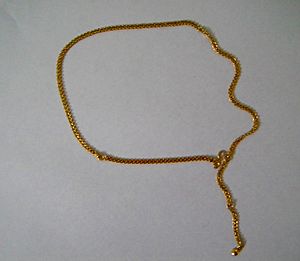Aranjanam facts for kids
An Aranjanam is a special kind of thin belt or tie. People in many parts of South Asia, especially South India, wear it around their waist. It's often made from shiny gold or a mix of black cotton and gold threads. This unique piece of jewellery is more than just an accessory; it holds deep cultural meaning for many families.
Contents
A Special Tradition
In South India, giving an Aranjanam to a baby boy is a very old and important tradition. This special event usually happens on the 28th day after the baby is born. It's a joyful ceremony where the family welcomes the new baby and gives them this symbolic belt. This custom is common among people of different religions across South India.
Why People Wear It
Parents and families believe that wearing an Aranjanam helps keep bad things away from the baby. It is thought to offer protection and bring good luck. This belief is a big part of why the tradition has continued for so many years. It shows how much families care for their children's well-being.
Materials Used
Aranjanams are typically made from two main types of materials. One popular choice is pure gold, which makes the belt look very beautiful and valuable. Another common type is made from black cotton threads woven together with gold. Both types are designed to be thin and comfortable for the wearer.
Who Wears an Aranjanam?
While the Aranjanam is traditionally given to baby boys, many adults in South Asia also continue to wear one. They usually wear it under their clothes, close to their skin. For many, it's something they keep on all the time, as a constant reminder of their culture and the protective beliefs associated with it. It becomes a personal and meaningful item that stays with them throughout their lives.
Images for kids
 | Chris Smalls |
 | Fred Hampton |
 | Ralph Abernathy |



